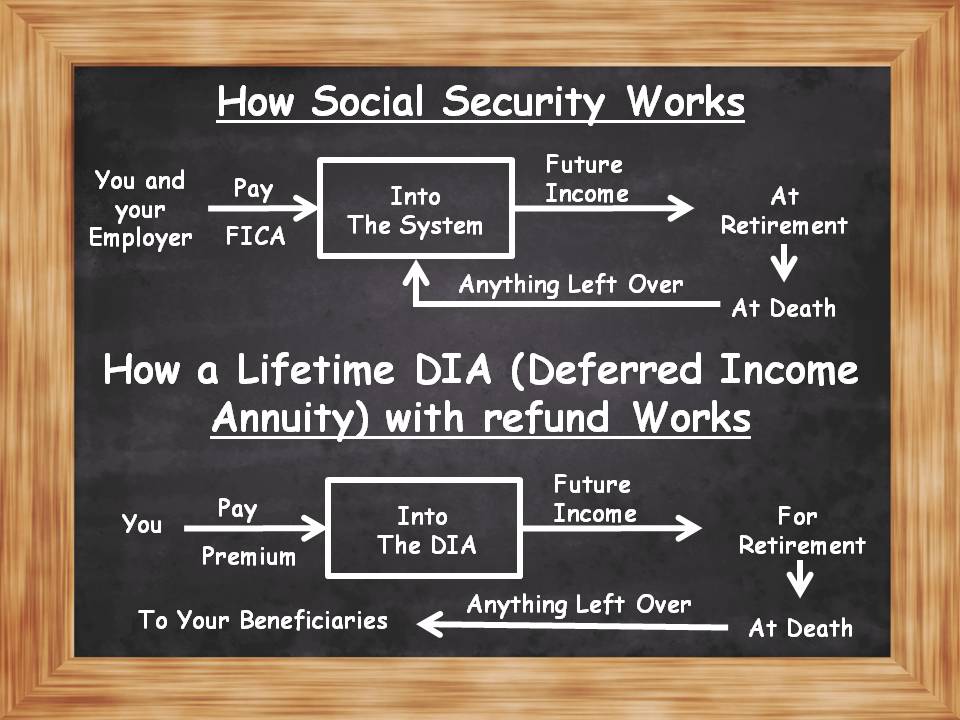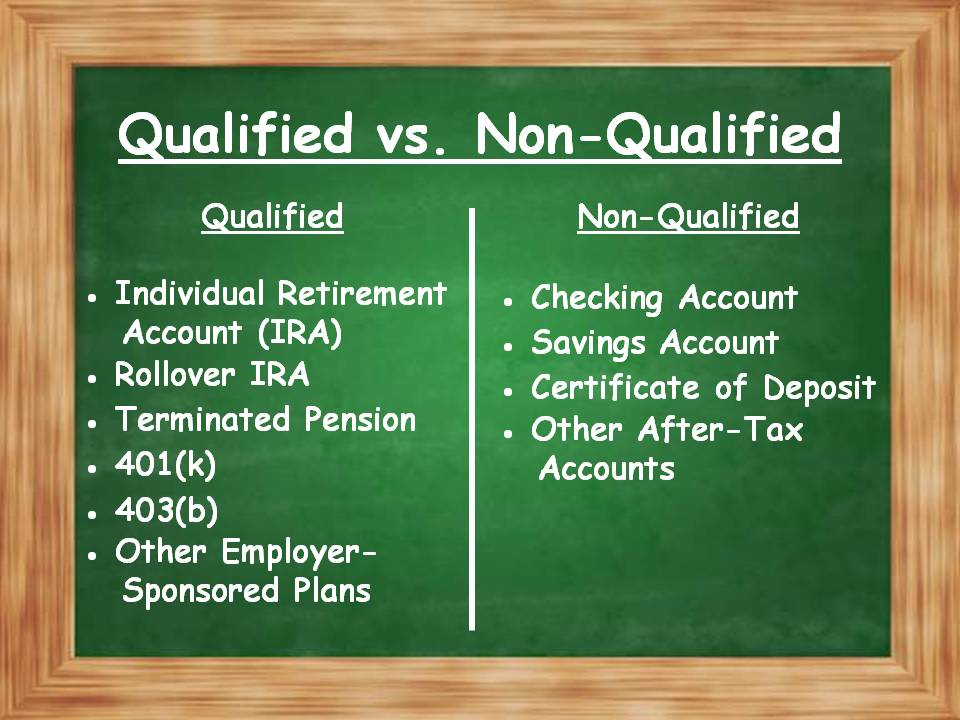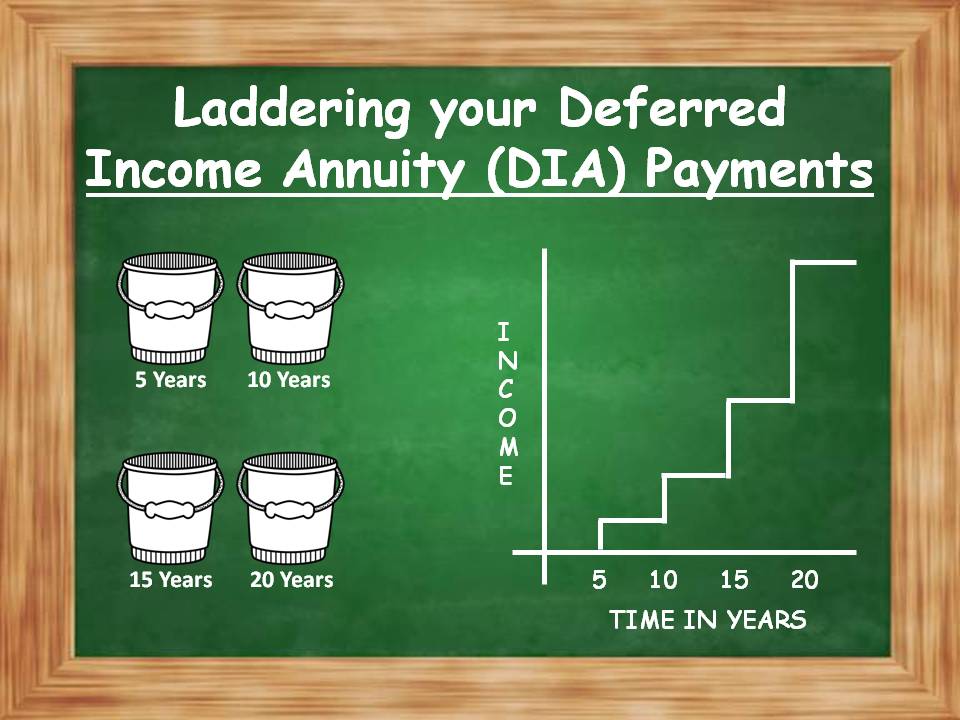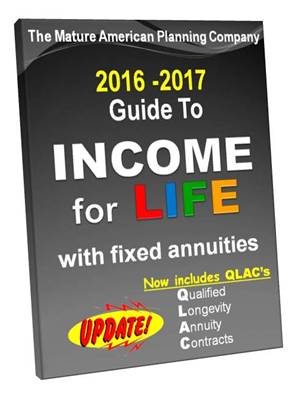Deferred Income Annuity (DIA)
What is a Deferred Income Annuity (DIA)
 Every time you pay into Social Security, you are paying for something like a Deferred Income Annuity (DIA). If you are an employee and get a paycheck, the FICA tax you pay is buying you into a promise of a lifetime income at some point in the future. Coincidentally that promise of a future lifetime income is also what a Deferred Income Annuity can do.
Every time you pay into Social Security, you are paying for something like a Deferred Income Annuity (DIA). If you are an employee and get a paycheck, the FICA tax you pay is buying you into a promise of a lifetime income at some point in the future. Coincidentally that promise of a future lifetime income is also what a Deferred Income Annuity can do.
How does a pension compare?
If you are lucky enough to have a pension, while you are working, your employer, not you, set money aside every year you work for a promise of a future lifetime income. You paid nothing for your pension. With a Deferred Income Annuity you, not your employer, set money aside for a promise of future income.

A Deferred Income Annuity is a pension like future income
A Deferred Income Annuity is similar to a future pension or supplement to Social Security when you retire. You can design it to meet your future income needs. It is all about you receiving income later on in life.
It’s something new
 If you have not heard of it, it’s because the Deferred Income Annuity (also known as Longevity Insurance or a Longevity Annuity) has only been available since December 2004 when MetLife first introduced the Personal Income Builder. A Deferred Income Annuity (DIA) is similar to a Single Premium Immediate Annuity (SPIA), except that you do not need to start income in the first 13 months. Most DIA’s begin paying income somewhere between 2 and 45 years later (deferral time varies by the insurance company).
If you have not heard of it, it’s because the Deferred Income Annuity (also known as Longevity Insurance or a Longevity Annuity) has only been available since December 2004 when MetLife first introduced the Personal Income Builder. A Deferred Income Annuity (DIA) is similar to a Single Premium Immediate Annuity (SPIA), except that you do not need to start income in the first 13 months. Most DIA’s begin paying income somewhere between 2 and 45 years later (deferral time varies by the insurance company).
How is Social Security different from a Deferred Income Annuity?
Social Security pays a partial lifetime income after age 62, and a full benefit after age 65 if you are retiring today. Social Security has minimum requirements before you can receive a lifetime of income when you retire. However, if you live a short life and there is anything left over, the government keeps the money.
How is a DIA different from Social Security and a pension?
A Deferred Income Annuity (DIA) can pay a lifetime of income at some point in the future, typically somewhere between two and forty-five years from now. There are no requirements to meet, so you are fully vested in the benefit. Unlike a pension or Social Security, you can choose to pass anything left over in the DIA to your heirs using a cash or installment refund rider.
DIA: A perfect replacement for the terminated pension
 If you are working, not retired, and your employer decides to cancel the employee pension, rather than buying an IRA or transferring the funds into your 401k, buy a Deferred Income Annuity. Having a DIA is the closest replacement for your pension and can pay you a guaranteed future lifetime income much like you expected from your pension. The DIA is an excellent choice for a do-it-yourself pension, personal pension or private pension.
If you are working, not retired, and your employer decides to cancel the employee pension, rather than buying an IRA or transferring the funds into your 401k, buy a Deferred Income Annuity. Having a DIA is the closest replacement for your pension and can pay you a guaranteed future lifetime income much like you expected from your pension. The DIA is an excellent choice for a do-it-yourself pension, personal pension or private pension.
Income for you or you and another person
 If you choose a future lifetime of income from a Deferred Income Annuity, you can receive a payment based on your life only with a single life payout. Or you could choose a joint life payout that could provide both you and another person a payment until the last one dies. You could choose a lifetime payment, or something shorter.
If you choose a future lifetime of income from a Deferred Income Annuity, you can receive a payment based on your life only with a single life payout. Or you could choose a joint life payout that could provide both you and another person a payment until the last one dies. You could choose a lifetime payment, or something shorter.
A reliable source of future income
There are three ways to buy a Deferred Income Annuity:
- The most popular way to buy a Deferred Income Annuity is with a single lump sum payment. With a specific payment amount, we would look for the longevity insurance company that pays you the maximum monthly income at the start point you plan to receive it.
- You could also choose a specific monthly income to start at a certain point in the future. With a specific monthly dollar amount and a start time, we would look for the longevity insurance company that provides you that income at that point in the future for the smallest lump sum payment possible.
- Lesser known is the flexible premium plan where you buy your Longevity Annuity over time using multiple payments. You would pay into the plan over time as you do with Social Security while you are working. This flexible premium Deferred Income Annuity is less common than the single payment plans.

Where does the money come from?
If you are buying a single payment Deferred Income Annuity, you can buy it with
• Non-qualified funds (like from a bank account).
• Qualified monies (like an IRA, 401k, 403b)
• Terminated pension plans.
• Other employer-sponsored plans.
But here’s the catch
When you buy a Deferred Income Annuity with qualified money, Uncle Sam will want you to pay taxes on every dollar you get from the DIA. So the entire income you receive from your DIA funded with qualified money will be fully taxable. Also, most longevity insurance companies will want you to start taking income by age 70 purchased when purchased with qualified funds.
The QLAC as an alternative
 Similar to the Deferred Income Annuity in design, the Qualified Longevity Annuity Contract (QLAC) allows you to defer taking withdrawals from a portion of your qualified money until age 85. Deposits into a QLAC are limited to the lesser of $125,000 or 25% of all qualified funds. Taxes are deferred on funds in a QLAC until you start taking income, which can be any time at or before age 85.
Similar to the Deferred Income Annuity in design, the Qualified Longevity Annuity Contract (QLAC) allows you to defer taking withdrawals from a portion of your qualified money until age 85. Deposits into a QLAC are limited to the lesser of $125,000 or 25% of all qualified funds. Taxes are deferred on funds in a QLAC until you start taking income, which can be any time at or before age 85.
The good news about Non-Qualified funds
There are potential tax advantages by purchasing a DIA with after-tax dollars. Income payments from non-qualified funds are paid on a tax-favorable basis, part principal and part interest. The technical term is “exclusion ratio” where a portion of the payment is non-taxable.
So where do you start?
Insurance companies sell Deferred Income Annuities. You make a lump sum premium payment or transfer into the DIA. Then you chose how you want to receive your money.
The best part is
The longevity insurance company is then on the hook to provide the promised income payment for you. Essentially by purchasing a Longevity Annuity (DIA), you are transferring your risk of living too long to the insurance company.
(Picture listing all the options in technical name on bulletin board teacher graphic)
The best choice for lifetime income is…
The popular choice is the joint life with survivorship or single life either with a cash refund or installment refund to heirs. This option provides you a lifetime of income no matter how long you live (for a single life) or you both live (for a joint life). If you die young and there is anything left over, your beneficiaries will get it.
And the great mystery is
So what do you want your beneficiaries to have?
• All the money right away (cash refund)
• The same payment until the premium is gone (installment refund).
The answer may depend on how your heirs handle their money currently.
Of course, if you want maximum income. . .
 You could choose the life only joint life with survivorship or single life only payment. That way you would get the largest payment of a lifetime of income no matter how long you live (for a single life) or you both live (for a joint life). When a payment stops at death is kind of how Social Security works in retirement, where anything left over, the government keeps it. In this case, if you die young and there is anything left over, the insurance company keeps it.
You could choose the life only joint life with survivorship or single life only payment. That way you would get the largest payment of a lifetime of income no matter how long you live (for a single life) or you both live (for a joint life). When a payment stops at death is kind of how Social Security works in retirement, where anything left over, the government keeps it. In this case, if you die young and there is anything left over, the insurance company keeps it.
We do not recommend this
In a joint payout, you could have a payment reduction at the death of the first person. While you get more when both people are alive, a decrease in income can shortchange the survivor. Most couples prefer a joint 100% payment for each person.
Would you prefer a more limited income?
If you do not want an income for life, you can choose to receive it for a certain period such as five to twenty years, or somewhere in between. A period certain payment is made to you and/or your beneficiary for the duration of time you chose, then stops at the end of that period.
Would you like a combo?
Of course, you could always go for the combination of the single life or joint life with survivorship and a period certain. This choice provides a lifetime of income no matter how long you live (for a single life) or you both live (for a joint life). If you die young, payments continue until the end of the stated period. If you live past the stated time then die, your heirs will get nothing.
You have no fees
 On the positive side, a Deferred Income Annuity has no annual fees. A Longevity Annuity (DIA) is all about income. You get an income based on the customizable income benefit you choose. There are no fees.
On the positive side, a Deferred Income Annuity has no annual fees. A Longevity Annuity (DIA) is all about income. You get an income based on the customizable income benefit you choose. There are no fees.
You have no market risk
Income from a Deferred Income Annuity does not have any market risk. A DIA can provide correction protection. An unfortunate sequence of returns, where you retire and lose a lot of money on Wall Street early on in retirement, could cripple your retirement plans. A steady future income could be a better choice.
What that means is:
Unlike money in the bank or on Wall Street, with a Deferred Income Annuity, you do not need to worry about chasing x percent return that cannot be guaranteed. You are guaranteed the income you chose. If you want a lifetime income, you will get an income you cannot outlive. You have transferred the risk of living too long to the insurance company.
Your income can increase each year
 Want to fight inflation? Then purchase your Deferred Income Annuity with a Cost Of Living Adjustment (COLA) rider. You chose the percentage increase (such as 1% to 5%), and that is the set amount your income will increase each year.
Want to fight inflation? Then purchase your Deferred Income Annuity with a Cost Of Living Adjustment (COLA) rider. You chose the percentage increase (such as 1% to 5%), and that is the set amount your income will increase each year.
Or you can skip the flat amount and…
Instead of buying a set amount for inflation protection you might choose the CPI-U rider. The yearly income increase will be determined by the Consumer Price Index for All Urban Consumers and may vary based on the index.
You can wait up to 45 years to get your first check.
While Deferred Income Annuity contracts vary from insurance company to insurance company, it is possible to buy a DIA at a very young age and defer the payment for up to 45 years. You could start taking income in as few as thirteen months.
Choose, but chose wisely
When you buy a Deferred Income Annuity, you are giving your money to a longevity insurance company who in return gives you a promise to pay you the future income you chose. You are purchasing that income payment with a lump sum payment. A DIA has:
• No cash surrender value.
• No accumulation value.
• Zero liquidity.
• No growth potential.
Why is this important?
For almost all Deferred Income Annuities, once you give the longevity insurance company your money to start the contract, you cannot get your money back. However, in exchange for your premium, you will know exactly what you will receive in future income.
But then again if your Social Security and pension will not be enough to pay your essential bills in the future, maybe a Deferred Income Annuity is right for you. If you retired without a pension, you might consider a Longevity Annuity (DIA) for a future private pension, personal pension or do-it-yourself pension.
What is the Return On Investment?
If you have a birth certificate with an expiration date on it, it is easy to figure out what your return on investment will be. Since expiration dates on birth certificates do not exist, there is no way to calculate your Return On Investment (ROI) until death. Since there is no cash surrender value in a Deferred Income Annuity, there is no chasing x percent return that cannot be guaranteed. Therefore, there is no ROI.
Be Advised:
Withdrawals from a Deferred Income Annuity before age 59½, could be subject to an additional 10% federal income tax penalty on any gain.
Laddering your Deferred Income Annuity
No one knows how much inflation to expect. If you have adequate income to live on today but are concerned about future income, you might consider a Deferred Income Annuity ladder. When using the laddering strategy, you split a payment into more than one annuity with different maturity dates.

How a Ladder works*
Take for example a man, age 65 with $400,000 to spread out over time. His ladder could look like this:
1. Buy a $100,000 Deferred Income Annuity. Defer income for 5 years. Then start taking out $740 per month for life.
2. Buy a $100,000 Deferred Income Annuity. Defer income for 10 years. Then start taking out $1,119 per month for life. For a total of $1,859 for life ($740 + $1,119).
3. Buy a $100,000 Deferred Income Annuity. Defer income for 15 years. Then start taking out $1,840 per month for life. For a total of $3,699 for life ($1,119 + $1,840).
4. Buy a $100,000 Deferred Income Annuity. Defer income for 20 years. Then start taking out $3,341 per month for life. For a total of $7,040 for life ($3,699 + $3,341).
The payouts are better the longer you wait.
* 09/01/17 Rates from Cannex using the current best lifetime payout from each period, using a lifetime payout with a five year certain.
Avoid Banks, Brokers, and Captive Agents
Find an independent financial professional that specializes in income planning who is not tied to a bank, brokerage house or insurance company. Bankers, brokers and captive agents generally have a limited inventory of Deferred Income Annuities to offer. Independent financial professionals can usually offer you more choices and may be in a better position to shop the DIA market.
Here is the real deal
Commissions on Deferred income Annuities are low compared to other annuities with income riders attached. Many agents, including some retirement seminar agents, are either unfamiliar with DIA’s or don’t recommend them because of their low commissions.
Spend no more than you actually need
If you need $1,000 per month starting at a specific date in the future, buy that exact amount, not a penny more. Purchase your Deferred Income Annuity from a highly rated longevity insurance company, maybe more than one. Be careful not to put too much into a Longevity Annuity (DIA). Let the longevity insurance company become responsible for you living too long.
We can’t Emphasize this enough
Remember that the income payments are backed by the financial strength and claims-paying ability of the longevity insurance company or companies you chose. It may be in your best interest to choose a highly rated company, or better yet, multiple companies. You can check ratings from sources like AM Best, Fitch, Moody's and Standard and Poor’s.
Also
Do not spend everything you have on Deferred Income Annuities. Before buying a DIA you should set aside adequate cash reserves to meet unexpected bills and emergencies. The general rule of thumb is about one year of income. Anything more and you probably are missing a financial opportunity.
 Start at the Finish
Start at the Finish
The best way to buy any deferred annuity with a lifetime income rider is with the end result in mind. Start with a budget. Set some goals or perhaps create a bucket list. Figure out how much you need on a monthly basis to protect your lifestyle. Subtract out Social Security and pension. You might want to purchase a deferred fixed annuity with an income rider to cover some or all of the remaining expenses.
The Key to figuring it out is
If you are like most people, you probably need additional information to help you plan your retirement lifestyle and determine if a Deferred Income Annuity is right for you. As a Bonus, we have created a guide to help you called “Start at the Finish Line.” It contains information to help you set goals and plan for the retirement lifestyle that you are looking for.
Request a Quote to see actual dollar amounts:
1. Based on your specific dollar amount or a lump sum payment. We would then look for the insurance company that pays you the maximum monthly income for that amount.
2. Based on your desired monthly income amount. We would then look for the insurance company that provides you that monthly payment for the smallest lump sum payment.
We usually quote lifetime benefits with a single payment, but you can request a shorter income payment period of a recurring plan
In Conclusion
The Deferred Income Annuity (DIA) can guarantee you a future retirement income that you cannot outlive. A DIA can provide a future pension-like income beyond what is provided from Social Security and a pension. If you do not have a pension and would like one, a DIA can become your future private pension, personal pension or a do-it-yourself pension.
Finally
If you are at or near retirement, and you have any questions about Deferred Income Annuities or just need a little guidance, feel free to contact us. We know retirement planning can be confusing, so it is important to get the facts before you make any long-term decision.



